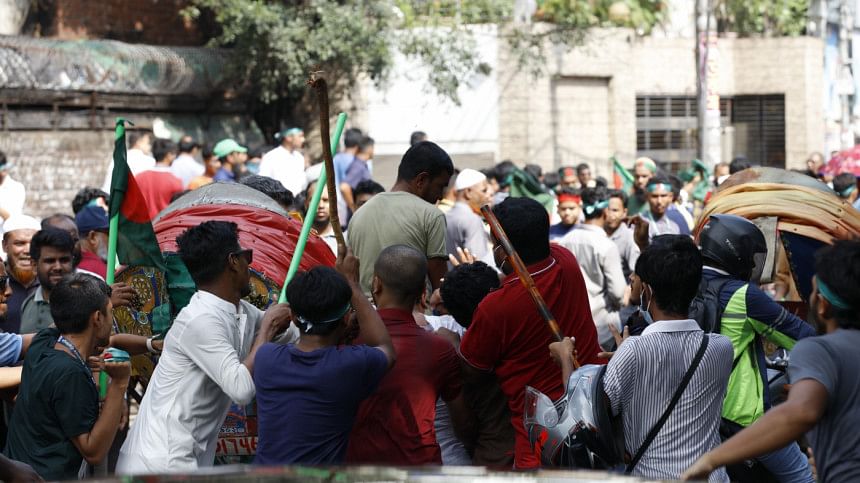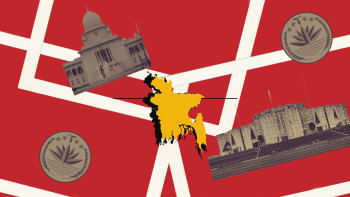Are we truly free in the new Bangladesh?

"Man is born free but everywhere else he is in chains." This famous line from the revolutionary political philosopher Rousseau's book The Social Contract prove somewhat relevant even more than 250 years after they were first published in 1762. In Rousseau's views, human beings were independent in their "natural state" but as they became part of a civilised society and formed political and social institutions, they became more and more constrained.
Rousseau, an endorser of human rights and democracy, believed that a government is legitimate only when they follow the general will or the will of the people. He believed that the will of the people should be sovereign. "The people being subject to the laws, ought to be their author: the conditions of society ought to be regulated solely by those who come together to form it," he argued.
Under the Hasina-led regime, we saw how helplessly chained we were in the face of an increasingly oppressive state. The regime was so engrossed in its development success story that it almost enjoyed a guilt-free pass to engage in whatever activities it needed to maintain its continued supremacy. This enabled a marked deterioration in our democratic status, with frequent violations of human rights through suppression, misuse of power, and state-sponsored violence against any form of dissent that rose against the ruling party. The fundamental tenets of a democratic society in which individual rights are expected to be upheld and reserved were ripped apart without remorse.
The events that unfolded in July 2024 following the peaceful student demonstrations against a discriminatory quota system fostered a sense of political awareness among the general population. In the aftermath, the people of Bangladesh, in attempts to reinstate their sovereignty, managed to achieve the unthinkable—bringing an end to Sheikh Hasina's autocratic regime. The government's collapse was seen as a direct result of its poor handling of the protest movement and finally entered Bangladesh into a revolutionary period.
In the new Bangladesh, one would not have to be too bold to hope for a society in which freedom of expression was truly exercised not merely encouraged. Unfortunately, this has been far from reality. In fact, the champions of our democratic rights who made the new Bangladesh possible turned out to be the first ones to challenge freedom of speech when it conflicted with their views of an ideal society.
"If you wish to preserve your existence, do not dare to utter a single word against the students and the people," said one coordinator, who was also one of the key organisers of the student movement. The following morning, in front of Dhanmondi 32, hundreds of people (including students allegedly) armed with sticks were seen obstructing people from paying respect to Bangabandhu Sheikh Mujibur Rahman on his 49th death anniversary. Media personnel were also not allowed to photograph the historic site which was once home to Bangabandhu's family. The event was described by Al Jazeera as: "a mob wielding bamboo rods and plastic pipes has been filmed beating people they suspect of supporting ousted Prime Minister Sheikh Hasina who had urged citizens to observe National Mourning Day, a holiday scrapped by the interim government."
One can't help but wonder—why have some leaders of our heroic movement adopted the exact same suppressive practices that they once took to the streets to oppose? Why did the former Home Affairs Adviser feel the immediate need to apologise following his advice to the Awami League party to reorganise its internal structure? No matter the gravity of the crimes that have been committed, is it truly fair to deny legal representation to Awami League leaders when they are brought in front of the court?
Has our much-celebrated revolutionary student movement truly freed us from the chains that Rousseau warned us against? It is hard to comprehend what this movement can truly achieve in the long run if we fail to overcome our tendency to admonish and oppress people when they are seen to be violating what we perceive to be acceptable social behaviour. This culture of fearmongering and norm enforcement should not be encouraged or embraced at the cost of eroding human rights once again. The youth icons who spearheaded the movement that put an end to 15 years of autocratic rule should remain vigilant not to undermine the legitimacy of their own victory. After all, with great power comes great responsibility.
Syeda Tasfia Tasneem has completed an MSc in Development Economics from the University of Oxford. She is currently the Director of Mariners Bangladesh.
Views expressed in this article are the author's own.
Follow The Daily Star Opinion on Facebook for the latest opinions, commentaries and analyses by experts and professionals. To contribute your article or letter to The Daily Star Opinion, see our guidelines for submission.

 For all latest news, follow The Daily Star's Google News channel.
For all latest news, follow The Daily Star's Google News channel. 




Comments